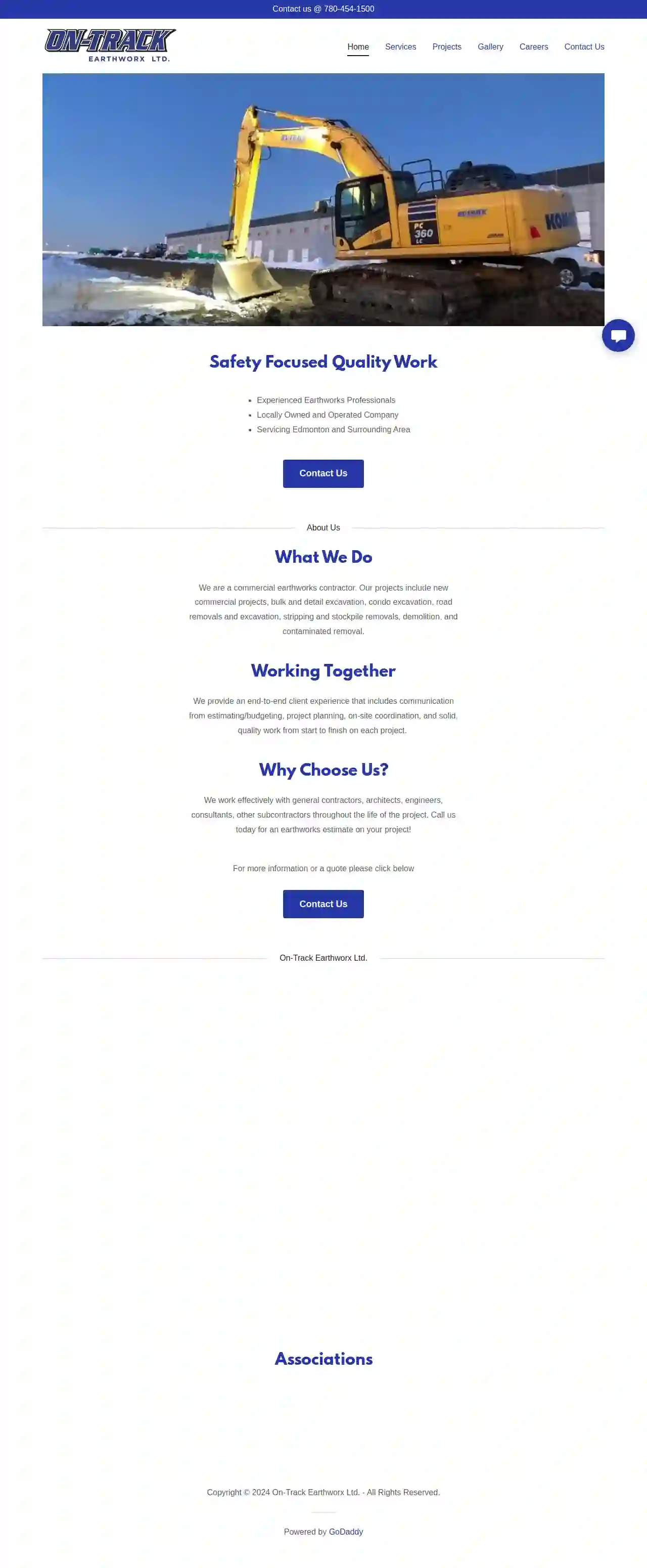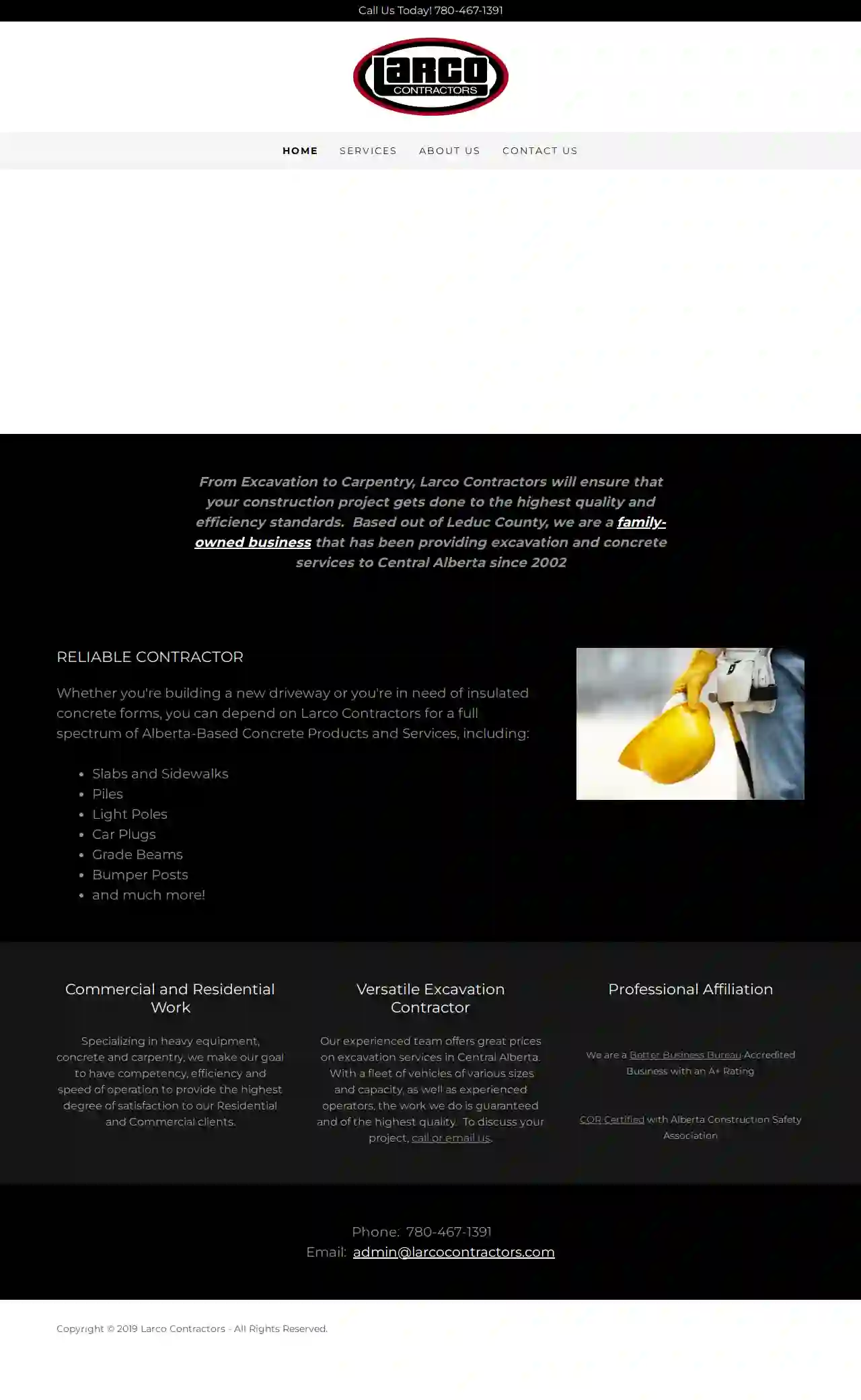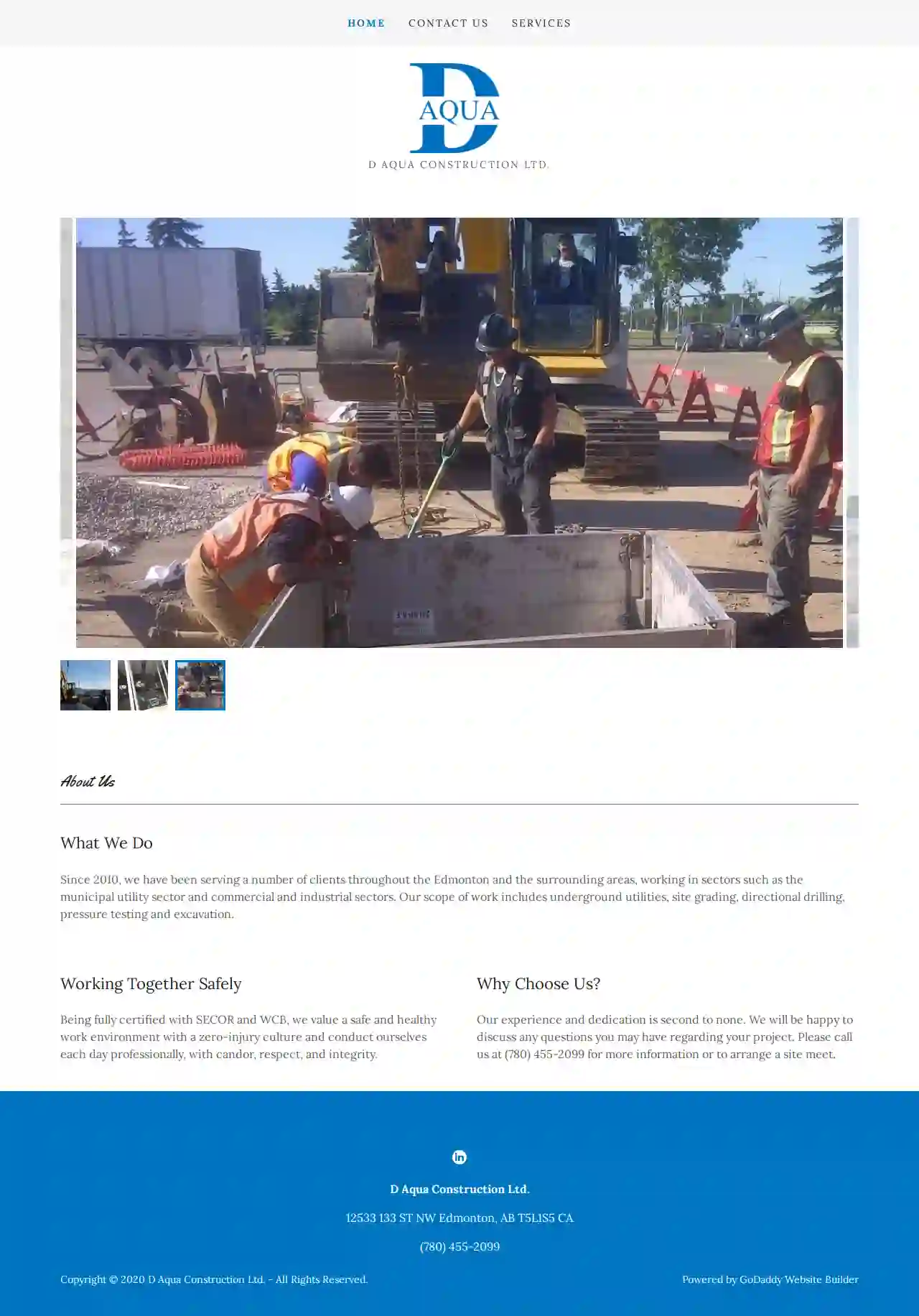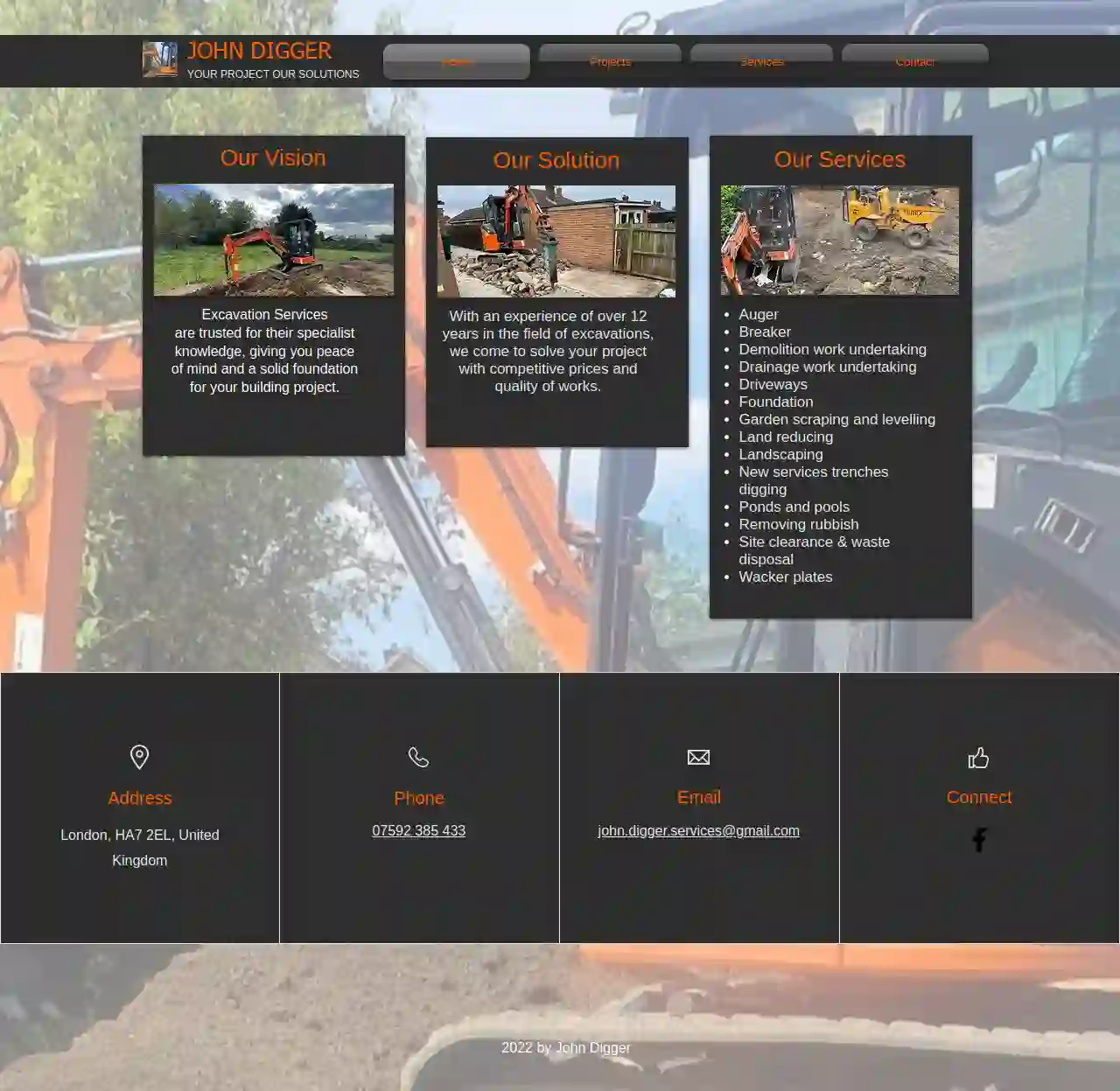Dirt Contractors Tottenham
Top 10 Dirt Hauling in Tottenham
Get multiple Dirt Hauling quotes for your project today! Compare profiles, reviews, accreditations, portfolio, etc... and choose the best deal.

LG Groundworks
Leatherhead, KT23 4NW, GBLG Groundworks: Your Trusted Partner for Site Preparation, Plant Hire, and Earthworks Welcome to LG Ground Works, your trusted partner for site preparation, plant hire, and earthworks services in the South East of the UK. Our company is founded on the principles of quality, reliability, and affordability, and we are dedicated to providing our customers with the best possible service. Site Preparation Services At LG Ground Works, we provide comprehensive site preparation services for residential, commercial, and industrial projects. Our team is experienced in handling all types of sites, regardless of size or complexity. We are committed to using the latest technology and techniques to ensure that your project is completed to the highest standard. Plant Hire Services We offer a wide range of plant hire services to help you complete your project quickly and efficiently. Our equipment is well-maintained, reliable, and available in different sizes to accommodate your project needs. Our team is experienced in handling heavy equipment, and they use advanced techniques and technologies to provide quality service. Coverage in the South East of the UK We are proud to offer our services throughout the South East of the UK. Our team has extensive experience working in this region and understands the unique challenges that come with the local terrain and weather conditions. We are committed to providing our customers with high-quality, reliable, and professional services, no matter where their project is located. Affordable Prices We understand that site preparation, plant hire, and earthworks can be a significant expense, and we strive to make our services as affordable as possible. Our team will work with you to find a solution that fits your budget while still delivering high-quality work. Professional Team At LG Ground Works, we pride ourselves on our professional team. All of our employees are trained and experienced in site preparation, plant hire, and earthworks services, ensuring that you receive high-quality workmanship every time. Our team uses the latest technology and techniques in the industry to ensure that your project is completed to the highest standard. Contact Us Today If you’re in need of site preparation, plant hire, or earthworks services, look no further than LG Ground Works. Contact us today to schedule a consultation and learn how we can help you get your project off to a great start. We are committed to providing high-quality, reliable, and affordable services to our valued customers.
- Services
- Why Us?
- Gallery
Get Quote
On-Track Earthworx Ltd.
4.73 reviews201-13630 159st, Edmonton, T5V 0C6, GBOn-Track Earthworx Ltd. is a locally owned and operated commercial earthworks contractor serving Edmonton and the surrounding area. We are committed to providing our clients with a safe and quality experience from start to finish. Our team of experienced professionals is dedicated to delivering exceptional results on every project. We work closely with general contractors, architects, engineers, consultants, and other subcontractors to ensure that projects are completed on time and within budget. We offer a wide range of services, including: Estimating and project management Bulk and detail excavation Site grading Concrete & asphalt removals Road excavation and grading Stockpile removals - load, haul and dispose Clay Import - supply, place, compact Trucking (tandems, end dumps, quads) Geotextile supply and place Aggregates and recycled concrete supply Underslab gravel - supply and place Contaminated material removal Demolition Mulching Dumpsites - Road use agreements We are proud of our commitment to safety and quality. We are also committed to working with our clients to ensure that their projects are completed to their satisfaction.
- Services
- Why Us?
- Our Team
- Gallery
Get Quote
Larco Contractors
#270, 50356 Range Road 232, Leduc County, T4X 1V2, GBLarco Contractors: Your Trusted Partner for Excavation, Concrete, and Carpentry in Central Alberta Since 2002, Larco Contractors has been a family-owned and operated business serving Central Alberta with a commitment to quality, efficiency, and customer satisfaction. We specialize in excavation, concrete, and carpentry services for both commercial and residential projects. Our team of experienced professionals is dedicated to delivering exceptional results, exceeding expectations, and building lasting relationships with our clients. We understand that construction projects can be complex and demanding. That's why we take a collaborative approach, working closely with our clients to ensure their vision is realized. From initial planning and design to project completion, we provide comprehensive support and guidance every step of the way. At Larco Contractors, we are proud of our reputation for reliability, integrity, and a strong work ethic. We are committed to safety, environmental responsibility, and delivering projects on time and within budget. Whether you need a new driveway, foundation, or a complete renovation, we have the expertise and resources to handle your project with precision and care. Contact us today to discuss your project and learn how Larco Contractors can help you achieve your construction goals.
- Services
- Why Us?
- Accreditations
- Gallery
Get Quote
ALSTRUCT Ltd
52 reviewsLondon, GBAbout Alstruct Alstruct is your one-stop solution for all your construction needs. With a commitment to excellence and a passion for precision, we offer a diverse range of specialized services to transform your vision into reality. Our expertise encompasses a wide spectrum of construction services: Ground Works, Drainage, Landscaping, and Paving: We believe in setting a solid foundation for success. Whether it’s designing effective drainage solutions, crafting captivating landscapes, or creating impeccably paved surfaces, we’re here to lay the groundwork for your dreams. Renovations, Fit-Outs, Painting, and Decorations: Your space should reflect your unique style and vision. Our team specializes in breathing new life into existing spaces, customizing interiors to your exact specifications, and adding the perfect finishing touches with expert painting and decorations. Reinforced Concrete Frames, Basements & Retaining Walls, Staircases: Structural integrity is at the core of our construction philosophy. Our expertise in reinforced concrete frames, basements, retaining walls, and intricate staircases ensures the durability and stability of your project. Brickwork & Stonework, Tiling: Our craftsmen possess an innate talent for the artistry of brickwork, stonework, and precision tiling. They create timeless and breathtaking finishes that enhance the beauty and elegance of your projects. Our Vision We place customer satisfaction and the quality at the heart of everything we do. Our clients’ dreams and aspirations for the best quality are our guiding stars. We listen, we understand, and we bring their visions to life in a way that exceeds their wildest expectations.
- Services
- Why Us?
- Gallery
Get Quote
Lenbeth Weeping Tile
454 reviews12820 - 55 St, Edmonton, GBLenbeth Group of Companies We believe that the achievements of an organization are the results of the combined efforts of every individual. With over 40 years of service, we feel very proud and fortunate when we look back at the journey of these significant and remarkable years. Over the next 40 years, we at Lenbeth look forward to further refining our strengths as we strive to create new business and products. We know that the growth and success of our company is largely dependent on having a strong and capable team. Today we will celebrate what we have accomplished, but always raise the bar a little higher each time we succeed, for you, our customers… With many awards received for our outstanding service, our focus on moving forward into our journey is to be bold with our vision. In keeping up with the most cutting edge products, we promise the best quality service, every time. We appreciate and value our customers, and would like to take this opportunity to thank you for being a huge part of our success over the years! LENBETH SERVICES Lenbeth, as Canada's largest telebelt and drainage tile company our scope of work has evolved to installing sump liners, window wells, rigid insulation, gravel in basements, repairs, waterproofing, trenching, slinger, telebelt services, and commercial and oilfield projects. With several diverse divisions, we retain and take pride in our team of accomplished managers of each of those divisions. We are available for all of your foundation drainage, damp proofing and waterproofing needs for any residential, commercial, oil field and energy projects.
- Services
- Why Us?
- Gallery
Get Quote
Champion Concrete Cutting
4.610 reviews4720 82 Ave NW, Edmonton, T6B 0E4, GBCut. Break. Remove. Replace. As your concrete contractors in Edmonton and the surrounding areas, we can provide free estimates. Contact Us PROFESSIONAL CONCRETE CONTRACTORS IN EDMONTON AND SHERWOOD PARK For top-tier concrete work in Edmonton and Sherwood Park, look no further than Champion Concrete Cutting. Since our establishment in 1990, we've been the trusted preference for a wide array of concrete services in Edmonton, Sherwood Park, and beyond. Our expertise spans concrete cutting, coring, core drilling, finishing, and decorative concrete installation. Whether based in Grande Prairie, Fort McMurray, Saskatoon, or anywhere in Western Canada, our skilled concrete contractors are ready to handle your project with precision and professionalism. At Champion Concrete Cutting we pride ourselves on delivering exceptional results, no matter the scope or complexity of the job. Our commitment to top-notch craftsmanship and customer satisfaction makes us the go-to concrete contractors in Edmonton and Sherwood Park. If you need concrete services, don't hesitate to get in touch with us today. Our team is ready to assist you with your project needs and provide expert guidance every step of the way. For more information, check out our blog for valuable insights and updates on our latest projects. WHY HIRE A PROFESSIONAL CONCRETE CONTRACTOR? When undertaking a project, you might choose amateurs for concrete solutions. However, after years of experience in the industry, we strongly believe that choosing the right concrete contractor can make or break a project. There are many reasons to hire professionals like us, such as: Save time and money: Opting for a professional concrete contractor in Edmonton can save you both time and money in the long run. These experts have the skills and equipment to complete your project efficiently, reducing the risk of costly mistakes and delays. Quality work: We bring years of experience, ensuring top-notch quality in every aspect of your concrete project. From proper site preparation to precise pouring and finishing techniques, you can trust their expertise for durable and visually appealing results. Knowledge of concrete: Professional contractors understand various concrete types, mixes, and applications in-depth. This expertise allows them to recommend the best-suited materials and techniques for your project, ensuring optimal performance and longevity. Comprehensive services: We offer an expansive range of services, including excavation, formwork, pouring, finishing, and sealing. By entrusting your project to a single contractor, you can streamline the process and enjoy seamless coordination from start to finish. Customization: Whether you're looking for a stamped concrete patio or a decorative driveway design, a professional contractor can bring your vision to life with customized solutions. Champion Concrete Construction Inc. works closely with clients to understand their preferences and deliver tailor-made results that exceed expectations. Would you like to know more about the reasons for hiring professionals like us? We invite you to contact our concrete contractors in Edmonton and the surrounding areas. WHY CHOOSE US? Champion Concrete Cutting Inc. is a committed concrete contractor in Sherwood Park, Edmonton and its surrounding areas to provide reliable services to all our customers. We strive to exceed our customer’s expectations and maintain our reputation in the industry. We can think of a few reasons we are the team for your job like: Our experience We have served Edmonton, Sherwood Park and its surrounding areas with expert concrete contractor services since 1990. Our experts We are trained and experienced in working on commercial, residential and industrial projects in Edmonton, Sherwood Park and surrounding areas. Our commitment to safety The safety of our clients and workers is always our top priority, especially worker safety. Our experts follow comprehensive health, safety, and environment plans enforced by management and a full-time safety supervisor. Range of services Our team offers a full range of concrete cutting, coring, demolition and removal services and various decorative and finishing concrete services. We can discuss planning and design support to meet your needs too! Excellent customer service We are known to deliver top-quality work completed on time and within your budget, thus giving us one of the highest customer satisfaction rates. Free estimates We offer a free estimate. We will take the time to understand all your requirements and suggest the perfect solutions for your needs and budget. Long-lasting and quality results We are known for our care, attention and positive attitude to every project. We are committed to delivering quality results and customer service to ensure your job looks and functions at its best for a long time. Get in touch with us to discuss your project with our experts at Champion Concrete Cutting Inc. We’d love to work with you! CALL US FOR MORE INFORMATION! At Champion Concrete Cutting, rest assured of top-notch service and exceptional outcomes every time you engage our concrete contractors for projects in Edmonton, Sherwood Park
- Services
- Why Us?
- Gallery
Get Quote
D AQUA Construction LTD
51 reviews12533 133 ST NW, Edmonton, T5L1S5, GBAbout Us Since 2010, D Aqua Construction Ltd. has been serving a number of clients throughout the Edmonton and surrounding areas, working in sectors such as the municipal utility sector and commercial and industrial sectors. Our scope of work includes underground utilities, site grading, directional drilling, pressure testing and excavation. Working Together Safely Being fully certified with SECOR and WCB, we value a safe and healthy work environment with a zero-injury culture and conduct ourselves each day professionally, with candor, respect, and integrity. Why Choose Us? Our experience and dedication is second to none. We will be happy to discuss any questions you may have regarding your project. Please call us at (780) 455-2099 for more information or to arrange a site meet.
- Services
- Why Us?
- Gallery
Get Quote
TMR Mini Digger & Driver Hire Luton
55 reviews16 Eldon road, Luton, LU4 0AU, GBAbout us TMR Mini Digger & Driver Hire Luton is a Bedfordshire-based, family-run business with years of experience in groundwork and excavation. We offer a range of diggers and attachments for both domestic and commercial projects. TMR Mini Digger & Driver Hire Luton is a trusted excavation service provider based in Luton, Bedfordshire. Our family-run business has years of experience in groundwork and operating diggers, and we are committed to delivering high-quality and reliable services to our clients. We have built an excellent reputation over the years, thanks to our dedicated team of skilled operators and state-of-the-art equipment.We cater to both domestic and commercial clients, including local builders, in Luton and the surrounding areas. Our range of services includes garden levelling, foundation excavation, driveway dig-outs, tree root removal, and more. We have 1-ton micro diggers for narrow access and up to 3-ton diggers for larger projects, ensuring that we can handle any excavation job, no matter the size. TMR Mini Digger & Driver Hire Luton, we pride ourselves on our commitment to providing a personalized service that meets the unique requirements of our clients. Our skilled operators work closely with you to understand your specific needs, ensuring that we deliver efficient and cost-effective solutions that meet or exceed your expectations. We also offer additional attachments such as dumpers and concrete breakers to get the job done efficiently. Our equipment is regularly maintained to ensure that it is in top condition, minimizing downtime and ensuring that we can complete your project on time and within budget. At TMR Mini Digger & Driver Hire Luton, no job is too big or small. We approach each project with the same level of commitment and dedication, ensuring that our clients are always satisfied with our services. Our goal is to provide high-quality excavation services that are reliable, efficient, and cost-effective. In conclusion, if you are looking for a trusted and reliable excavation service provider in Luton and the surrounding areas, TMR Mini Digger & Driver Hire Luton is a perfect choice. Contact us today to discuss your excavation needs and get a quote.
- Services
- Why Us?
- Gallery
Get Quote
John Digger Services
55 reviewsLondon, HA7 2EL, GBOur Vision John Digger Services are trusted for their specialist knowledge, giving you peace of mind and a solid foundation for your building project. Our Solution With an experience of over 12 years in the field of excavations, we come to solve your project with competitive prices and quality of works.
- Services
- Why Us?
- Gallery
Get Quote
Herts Landscapes and construction Ltd
54 reviews58 Bridge Road, Welwyn Garden City, AL8 6UR, GBWelcome to Herts Landscapes and Construction Ltd We offer a garden design and construction service, for clients seeking to enjoy the benefits of a seamless extension of your indoor living accommodation into your outdoor space, creating an area which is both beautiful and functional for all lifestyles. From initial concept to creation, we can create the perfect outdoor environment to benefit all needs, from urban courtyards with contemporary, or traditional garden styling, with high levels of detailed hard and soft landscaping schemes. Free consultation-to establish needs and requirements, whether you need advice on planting or planning permission to submit to local council offices. Concept Garden Design Service to help you visualise your scheme. Planting Plans, planting and supply of plants to create the wow factor in your garden. Lighting plans, to control which features are highlighted in the garden, drawing attention to key focal points and amplifying their impact, and helping to create a unique ambience for each section of the garden. What makes us different? From planning and landscaping to after-care: we help you make your dreams come true. Who are we? Trust the experts: our experience supplies you with a wealth of ideas and expertise. What we do for you? Landscaping, Building, Hard and soft landscaping, Drives, Patios, Brick Work, Lawns, Ponds, Water Features and home Extensions: you're sure to be impressed by our range of services.
- Services
- Why Us?
- Gallery
Get Quote
Over 13,059+ Excavation Companies registered
Our excavation experts operate in Tottenham and surroundings!
ExcavationHQ has curated and vetted Top Excavation Contractors near Tottenham. Find the most trustworthy pro today.
Frequently Asked Questions About Dirt Contractors
- Increases Soil Stability: Compacted soil is less likely to shift, settle, or erode, providing a stable foundation for structures, walkways, or driveways.
- Improves Drainage: Compaction can enhance drainage by reducing the soil's porosity and allowing water to flow more efficiently.
- Reduces Settlement: Proper compaction minimizes future settling, preventing uneven surfaces or structural damage.
- Enhances Load-Bearing Capacity: Compacted soil can support heavier loads without excessive compression or deformation.
- Online Directories: Utilize online directories like ExcavationHQ that specialize in connecting homeowners and businesses with qualified contractors. You can filter your search by location, service type, and read reviews from previous customers.
- Referrals: Ask friends, family, neighbors, or colleagues for recommendations based on their experiences with dirt contractors.
- Local Building Supply Stores: Inquire at local building supply stores, as they often have connections with contractors in the area.
- Online Reviews: Check online review platforms like Google My Business, Yelp, and Angie's List for insights into contractor reputations and customer feedback.
- Dirt Type: Clay soils tend to settle slower than sandy soils due to their smaller particle size and higher water retention.
- Compaction: Proper compaction helps accelerate the settling process by reducing air pockets and increasing soil density.
- Moisture Content: Excessive moisture can prolong settling time, as the water needs to evaporate or drain away.
- Weather Conditions: Warm, dry weather promotes faster settling compared to cold or wet conditions.
- Excavators: Versatile machines with a digging arm and bucket, used for excavation, trenching, loading trucks, and demolition.
- Bulldozers: Heavy machines with a large blade at the front, used for pushing and moving dirt, clearing land, and grading.
- Skid Steers: Compact, versatile machines with various attachments, including buckets, forks, and augers, used for digging, loading, grading, and more.
- Dump Trucks: Heavy-duty trucks designed for hauling dirt, gravel, and other bulk materials. Sizes vary based on carrying capacity.
- Graders: Machines with a long blade used for precise leveling and shaping of land surfaces, often used for road construction and site preparation.
- Compactors: Equipment used to compress soil, including plate compactors, rollers, and vibratory tampers, essential for achieving soil stability.
What is dirt compaction, and why is it important?
How do I find a reputable dirt contractor near me?
How long does it take for dirt to settle after delivery?
What are some common dirt contracting equipment?
What is dirt compaction, and why is it important?
- Increases Soil Stability: Compacted soil is less likely to shift, settle, or erode, providing a stable foundation for structures, walkways, or driveways.
- Improves Drainage: Compaction can enhance drainage by reducing the soil's porosity and allowing water to flow more efficiently.
- Reduces Settlement: Proper compaction minimizes future settling, preventing uneven surfaces or structural damage.
- Enhances Load-Bearing Capacity: Compacted soil can support heavier loads without excessive compression or deformation.
How do I find a reputable dirt contractor near me?
- Online Directories: Utilize online directories like ExcavationHQ that specialize in connecting homeowners and businesses with qualified contractors. You can filter your search by location, service type, and read reviews from previous customers.
- Referrals: Ask friends, family, neighbors, or colleagues for recommendations based on their experiences with dirt contractors.
- Local Building Supply Stores: Inquire at local building supply stores, as they often have connections with contractors in the area.
- Online Reviews: Check online review platforms like Google My Business, Yelp, and Angie's List for insights into contractor reputations and customer feedback.
How long does it take for dirt to settle after delivery?
- Dirt Type: Clay soils tend to settle slower than sandy soils due to their smaller particle size and higher water retention.
- Compaction: Proper compaction helps accelerate the settling process by reducing air pockets and increasing soil density.
- Moisture Content: Excessive moisture can prolong settling time, as the water needs to evaporate or drain away.
- Weather Conditions: Warm, dry weather promotes faster settling compared to cold or wet conditions.
What are some common dirt contracting equipment?
- Excavators: Versatile machines with a digging arm and bucket, used for excavation, trenching, loading trucks, and demolition.
- Bulldozers: Heavy machines with a large blade at the front, used for pushing and moving dirt, clearing land, and grading.
- Skid Steers: Compact, versatile machines with various attachments, including buckets, forks, and augers, used for digging, loading, grading, and more.
- Dump Trucks: Heavy-duty trucks designed for hauling dirt, gravel, and other bulk materials. Sizes vary based on carrying capacity.
- Graders: Machines with a long blade used for precise leveling and shaping of land surfaces, often used for road construction and site preparation.
- Compactors: Equipment used to compress soil, including plate compactors, rollers, and vibratory tampers, essential for achieving soil stability.